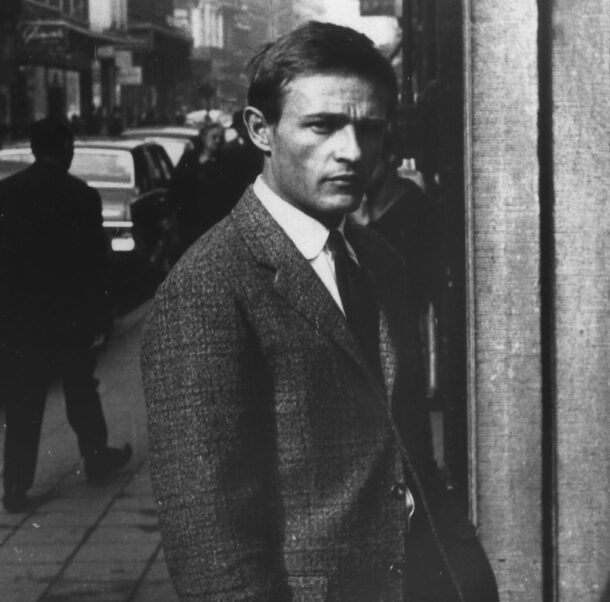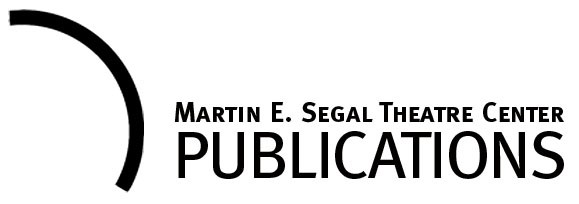By Dominika Laster
Mieczysław Janowski, great Polish theatre and film actor, and core member of Grotowski’s Theatre of 13 Rows and the Laboratory Theatre, passed away on 25 September 2021 in Wrocław. Janowski was born in Warsaw on 22 March 1935. His entire education, as he would later say, came from the student theatre. He made his theatre debut in Jubileusz [Jubilee] directed by Waldemar Krygier (1928-2006) on 13 June 1958 at Teatr 38 in Kraków. Janowski continued to work with this experimental student theatre until 1963 appearing in such performances as Samuel Beckett’s Krapp’s Last Tape and Zygmunt Krasiński’s Nie-Boska komedia [Undivine Comedy] and playing the title roles in Arthur Adamov’s Professor Taranne and Juliusz Słowacki’s Samuel Zborowski. In 1961, Janowski performed in Adam Mickiewicz’s Forefather’s Eve and Ludovico Aristo’s Orlando Furioso at the Teatr Rapsodyczny [Rhapsodic Theatre] in Kraków.
Janowski began his collaboration with renowned Polish theatre director and performance researcher Jerzy Grotowski (1933-1999) in September of 1964 at the Theatre of 13 Rows in Opole. Ludwik Flaszen, the theatre’s co-founder and literary director, had seen Janowski perform in Kraków and arranged for him to meet Grotowski. Janowski recalls that his first meeting with Grotowski took place in the restaurant of the train station. Grotowski had brought a contract for him to sign that very first meeting. In the Theatre of 13 Rows, Janowski first played Jacob in The Tragical History of Dr. Faustus based on Christopher Marlowe’s drama, replacing Maciej Prus in the role. He later appeared as Laertes in Studium o Hamlecie [Hamlet Study], a performance based on the textual material of William Shakespeare and its adaptation by Polish dramatist Stanisław Wyspiański. Janowski also participated in work on Samuel Zborowski in which he was cast in the role of the Bishop.
Janowski was also a performer in the Laboratory Theatre’s masterwork Akropolis an adaptation of Stanisław Wyspiański’s dramatic poem. The piece premiered in Opole on 10 October 1962 and was subsequently revived in several different versions. Janowski appeared in versions III and IV. The royal castle encircled by a moat and located on Wawel Hill in the center of Kraków serves as the Polish analogue of the Athenian Acropolis in Wyspiański’s Romantic drama. In Grotowski’s production it is transposed to the extermination camp, which represents the graveyard of tradition and the necropolis of European civilization. Akropolis emerged as a co-creation of Grotowski and painter and scenic designer Józef Szajna (1922-2008) who was responsible for the set design, costumes, and props. Szajna, who developed the aesthetic vision for Akropolis, was himself imprisoned in Auschwitz and Buchenwald. Peter Brook famously argued that in the production of Akropolis something of the reality of the camp actually emerges. In his introduction to the 1968 film documentation of the work, Brook contended, “At certain moments in Akropolis, because a nameless horror was not described, was not referred to, was not something that once happened in a place called Auschwitz, it was actually brought into being.” Janowski, who along with his fellow actors, disappeared into the rectangular wooden container – a stand-in for the crematorium – at the end of each performance, was also a survivor of two Nazi camps. Janowski recalled that – given the modest size of the container – he and his colleagues had to slip into it in such a way that the puzzle-pieces of their bodies fit perfectly together in order for the cover to close above them.
Janowski’s perhaps most famous performance was in the Laboratory Theatre’s iconic work The Constant Price based on Julisz Słowacki’s adaptation of Pedro Calderón de la Barca’s historical drama, where he played alongside Ryszard Cieślak (1937-1990), Rena Mirecka (b. 1934), Maja Komorowska (b. 1937), and Stanisław Ścierski (1939-1983). Janowski appeared in the role of Muley in versions I and II of the piece, and toured internationally with the production. He would later reveal that the emotional score – or what to the audience appeared as a long exchange with the Infante Don Fernando – was an internal conversation with Janowski’s father who was murdered in Auschwitz at the age of thirty-three. Looking back, Janowski recounted certain performance details perceptible only to him and his fellow actors by virtue of proximity. For instance, he remembered that Cieślak’s performance score was so precise that in a particular moment of each performance of The Constant Price, he shed exactly one tear. Not one, not two, Janowski insisted, but one.
In a public conversation convened by Grotowski archivist Agnieszka Wójtowicz that took place in Opole on 4 April 2016, Janowski said “We toured the whole world in Polish, and everyone understood what was going on.” In the context of the same conversation, Janowski contended that Grotowski did not care if the public liked Laboratory Theatre performances or not, what was important is that they remembered them. A charismatic speaker, at times Janowski liked to subvert expectations. In his characteristically playful manner, he compared Grotowski’s theatre to a car accident – a car accident that you will never forget.
Janowski was a gifted raconteur and enjoyed enacting anecdotes from the theatre’s rehearsal process. For instance, he described one occasion when – in typical Laboratory Theatre fashion – all the actors were gathered around attentively observing Grotowski’s work with a single performer. This time it happened to be Janowski. He was given the prompt “the back is crying.” Agile in body, he set his back and shoulders in motion shaking, shivering, trembling, and quivering. At each attempt, Grotowski would announce his verdict “I don’t believe you.” This was one of Grotowski’s most often used criterium for determining whether the actor’s work was effectual. At each pronouncement, Janowski would renew his efforts, but time and again was met with Grotowski’s “I don’t believe you.” After hours of work, in his mounting frustration, Janowski grabbed a chair and ran toward Grotowski shouting expletives. Just as the chair was about to meet the director’s head, Grotowski said: “Now, I believe you.” When describing the rehearsal process, Janowski recalled that Grotowski would often say “Don’t talk, do. Don’t act, be.” No one acted in our theatre, Janowski recounted, we were always ourselves.
Janowski was a core member of the Laboratory Theatre and played in all the main productions during his eight years with the ensemble. With Grotowski’s assistance and support, he received a fellowship from the French government to study in Paris, which he undertook while on leave from the theatre. He officially left the Laboratory Theatre in April 1970 shortly before its dissolution and Grotowski’s exit from the “theatre of productions” period, which signaled the transition to the paratheatrical phase of his research announced publicly by the director at New York University on 13 December 1970.
After his work with Grotowski, Janowski went on to play numerous roles in the Teatr Dramatyczny [Dramatic Theatre] in Wałbrzych and Teatr Współczesny [Contemporary Theatre] in Wrocław. He also worked as an actor in television and film. Janowski’s film career was particularly prodigious, spanning over four decades and well over a hundred films. In addition to his work as an actor, he also served as assistant director on numerous film projects. In 1999, he was decorated by the President of Poland with the Gold Cross of Merit for his entire artistic oeuvre.
Despite his dynamic and extensive acting career after 1970, Janowski felt that his most significant and memorable experiences were with Grotowski and his colleagues at the Laboratory Theatre. In the final decades of his life, he shared those experiences with younger generations of theatre artists and students in the context of workshops, symposia, film screenings, and public talks. He took part in an event pivoting around The Constant Prince at the University of Kent in Canterbury in 2007. In 2009, he was a guest artist at Tracing Grotowski’s Path: Year of Grotowski in New York a six-month-long series of events curated by Richard Schechner, which coincided with UNESCO’s designation of 2009 as the “Year of Grotowski.” The same year, he also participated in the British Grotowski Project conference curated by Paul Allain. He later traveled to Brazil, Australia, and Sweden to take part in artistic exchanges organized by universities and other cultural institutions. In November of 2012, Janowski returned to the United States with fellow Laboratory Theatre actor Andrzej Paluchiewicz to participate in a series of events at Yale University, which included screenings of rare archival documentation of performances directed by Grotowski as well as public talks. Later that month, the two actors also presented at Robert Wilson’s Watermill Center in New York.
Janowski was a lively and moving speaker who shared his experiences of working in the Laboratory Theatre with enthusiasm, humor, and vigor. I had the honor of serving as his Polish-English interpreter at numerous public events. On these occasions, his passion and volubility were uncontainable leaving no pauses for the translation. Realizing I needed to shift to simultaneous interpretation, I attuned myself even more closely to his rhythm. In this way, I felt carried by his waves of expression overflowing with the desire to share. He was a beloved friend with close, lifelong ties to my family, and will be dearly missed.
As he would often end his public talks – referring to himself and his Laboratory Theatre colleagues:
Mówiliśmy od serca
We spoke from the heart

Mieczysław Janowski. Photo courtesy of Andrzej Paluchiewicz.
Dominika Laster is Associate Professor of Theatre and Performance Studies at the University of New Mexico. She is the author of Grotowski’s Bridge Made of Memory: Embodied Memory, Witnessing and Transmission in the Grotowski Work (2016). In 2009, she served as the Associate Curator of Tracing Grotowski’s Path: Year of Grotowski in New York.

European Stages, vol. 16, no. 1 (Fall 2021)
Editorial Board:
Marvin Carlson, Senior Editor, Founder
Krystyna Illakowicz, Co-Editor
Dominika Laster, Co-Editor
Kalina Stefanova, Co-Editor
Editorial Staff:
Alyssa Hanley, Assistant Managing Editor
Emma Loerick, Assistant Managing Editor
Advisory Board:
Joshua Abrams
Christopher Balme
Maria Delgado
Allen Kuharsky
Bryce Lease
Jennifer Parker-Starbuck
Magda Romańska
Laurence Senelick
Daniele Vianello
Phyllis Zatlin
Table of Contents:
- Berliner Theatertreffen Fights to Survive as Live Theatre Adapts to World Conditions by Steve Earnest
- Cultural Passport for Piatra Neamț Theatre Festival 2021 by Oana Cristea Grigorescu
- We See the Bones Reflected: Luk Perceval’s 3STRS in Warsaw, 2021 by Chris Rzonca
- Festival Grec 2021 by Maria Delgado and Anton Pujol
- Report from London (November – December, 2019) by Dan Venning
- A National Theatre Reopens by Marvin Carlson
- In Memoriam: Mieczysław Janowski, 1935 – 2021 by Dominika Laster
- In Memoriam: Jerzy Limon, 1950–2021 by Kathleen Cioffi
- In Memoriam: Marion Peter Holt
www.EuropeanStages.org
europeanstages@gc.cuny.edu
Martin E. Segal Theatre Center:
Frank Hentschker, Executive Director
Marvin Carlson, Director of Publications
©2021 by Martin E. Segal Theatre Center
The Graduate Center CUNY Graduate Center
365 Fifth Avenue
New York NY 10016
European Stages is a publication of the Martin E. Segal Theatre Center ©2021



